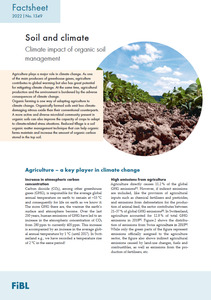{Tool} Soil and climate. [Boden und Klima.] Creator(s): Skinner, Colin; Steffens, Markus; Lori, Martina; Bongiorno, Giulia; Klaiss, Matthias; Arncken, Christine; Dierauer, Hansueli; Bünemann, Else K.; Müller, Adrian; Niggli, Urs; Gattinger, Andreas; Mäder, Paul; Krauss, Maike; Fliessbach, Andreas and Krause, Hans-Martin. Issuing Organisation(s): FiBL - Research Institute of Organic Agriculture. (2022)
![[thumbnail of 2024-09-04 16_42_30-Soil and climate - Climate impact of organic soil - 1349-soil-and-climate.pdf – .png]](/54052/1.hassmallThumbnailVersion/2024-09-04%2016_42_30-Soil%20and%20climate%20-%20Climate%20impact%20of%20organic%20soil%20-%201349-soil-and-climate.pdf%20%E2%80%93%20.png)  Preview |
Image (PNG)
- Cover Image
- English
346kB |
|
PDF
- Published Version
- English
9MB | |
|
PDF
- Published Version
- German/Deutsch
9MB | |
|
PDF
- Published Version
- French/Francais
2MB | |
|
PDF
- Published Version
- Hungarian/Magyar
9MB |
Document available online at: https://www.fibl.org/en/shop-en/1349-soil-and-climate
Summary in the original language of the document
This factsheet takes a closer look at the multifaceted role of agriculture in climate change. Various scientific findings are presented that show the potential of organic farming to mitigate climate change.
Summary translation
In diesem Merkblatt wird die vielschichtige Rolle der Landwirtschaft beim Klimawandel näher beleuchtet. Es werden verschiedene wissenschaftliche Erkenntnisse vorgestellt, die das Potenzial des ökologischen Landbaus zur Abschwächung des Klimawandels aufzeigen.
| EPrint Type: | Practice tool |
|---|---|
| Teaser: | Climate impact of organic soil management. |
| What problem does the tool address?: | Agriculture plays a major role in climate change. As one of the main producers of greenhouse gases, agriculture contributes to global warming but also has great potential for mitigating climate change. At the same time, agricultural production and the environment are burdened by climate change's adverse consequences. |
| What solution does the tool offer?: | Organic farming is one way of adapting agriculture to climate change. Organically farmed soils emit less climate-damaging nitrous oxide than their conventional counterparts. A more active and diverse microbial community present in organic soils can also improve the capacity of crops to adapt to climate-related stress situations. Reduced tillage is a soil organic matter management technique that can help organic farms maintain and increase the amount of organic carbon stored in the top soil. |
| Country: | Switzerland |
| Type of Practice Tool: | Leaflets & guidelines |
| Keywords: | climate change, environmentl protection, climate change adaptation, climate-smart agriculture, resilience |
| Agrovoc keywords: | Language Value URI English climate change http://aims.fao.org/aos/agrovoc/c_1666 English environmental protection http://aims.fao.org/aos/agrovoc/c_15898 English climate change adaptation http://aims.fao.org/aos/agrovoc/c_1374567058134 English climate smart agriculture -> climate-smart agriculture http://aims.fao.org/aos/agrovoc/c_1361789093890 English resilience http://aims.fao.org/aos/agrovoc/c_1374480530924 |
| Subjects: | Soil Environmental aspects Farming Systems > Farm nutrient management |
| Research affiliation: | Switzerland > FiBL - Research Institute of Organic Agriculture Switzerland > Sustainability > Climate European Union > Horizon Europe > OrganicClimateNET > selected tools European Union > Organic Farm Knowledge |
| Horizon Europe or H2020 Grant Agreement Number: | 101136880 |
| Related Links: | https://organic-farmknowledge.org/tool/54052, https://organic-farmknowledge.org/tool/52974, https://organicclimatenet.eu/ |
| Project ID: | OFK |
| Deposited By: | Rüger, Madelaine Lea |
| ID Code: | 54052 |
| Deposited On: | 21 Oct 2024 08:09 |
| Last Modified: | 13 Mar 2025 09:20 |
| Document Language: | English, German/Deutsch, French/Francais, Hungarian/Magyar |
| Status: | Published |
Repository Staff Only: item control page

 Download Statistics
Download Statistics Download Statistics
Download Statistics
